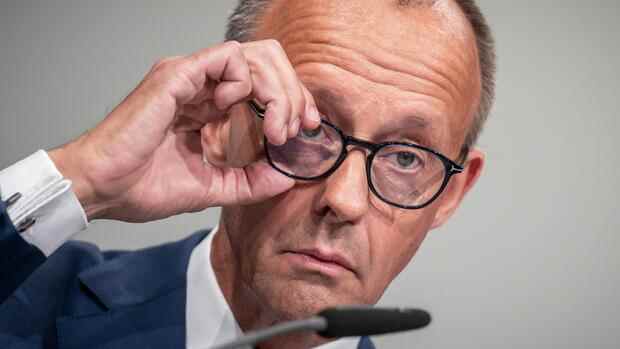Berlin They elected him to give the party direction again, to show a clear edge and no longer to moderate for the sake of power, as was the case under Angela Merkel. On Monday evening, CDU leader Friedrich Merz used the Bild TV stage to meet the expectations of CDU members and once again wedged at the federal government.
And this time he also lashed out at the roughly one million Ukrainian refugees seeking protection in Germany.
“We are now experiencing social tourism from these refugees: to Germany, back to the Ukraine, to Germany, back to the Ukraine,” said the CDU leader and immediately followed up on Tuesday morning via social media for everyone who didn’t see tabloid television had pursued.
It didn’t take long for the story to boomerang – on the day on which the CDU/CSU parliamentary group wanted to confirm their chairman with an overwhelming result in office. And a few days before the state elections in Lower Saxony, where the CDU wants to take power.
Top jobs of the day
Find the best jobs now and
be notified by email.
The term “social tourism” was the word of the year in 2013, when primarily Eastern Europeans abused the freedom of movement within the European Union.
Full buses to Kyiv as weak evidence
This time a storm of protest rose again. Journalists asked questions, including at the morning press briefing that the parliamentary director of the CDU/CSU parliamentary group, Thorsten Frei, regularly holds during parliamentary session weeks.
>> Read here: Energy policy without ideology? Controversy over energy course continues – not only with the opposition
The group’s domestic policy expert had to admit that there were no figures to back up his group leader’s claim. Oh yes, the buses from the provider Flixbus to Kyiv have been fully booked for weeks, Frei tried to support Merz’s claim at least a little.
When asked, Flixbus said that most connections between Ukraine and Germany were in fact “fully booked for several weeks”. But that is “not a new development, demand has been very high since spring”.
“It was certainly a very pointed formulation to point out a problem that might exist,” admitted Frei. After all, the European Union put the mass immigration regulation for refugees into force for the first time with the Ukraine war. It allows Ukrainians to claim social benefits immediately.
Political opponent seizes the moment
During the press round, Merz apologized on social media: There had been “a lot of criticism”. He “regrets” having used the word “social tourism”. It is an “inaccurate description of a problem that can be observed in individual cases”.
It was far from his intention to criticize the refugees from Ukraine, who are confronted with a hard fate. Shortly thereafter, the head of the CSU state group, Alexander Dobrindt, declared the matter “closed”.
The party said: It is a pity that Merz made a mistake on the Ukraine issue. After all, in the past few months he has skilfully pushed the federal government on the issue of the visit to Kyiv, including arms deliveries.
Of course, the political opponent took advantage of the moment, as the state election campaign is raging in Lower Saxony: Federal Minister of the Interior Nancy Faeser from the SPD called the statements of the CDU leader “shabby”. FDP faction leader Christian Dürr described the statements as “absolutely out of place”.
For CDU top candidate Bernd Althusmann, the Merz word is likely to burden his election campaign in the remaining days until October 9th. So far there has only been one topic: the energy crisis.
However, the CDU hardly benefits from the chaos within the federal government surrounding the question of how to get energy prices under control in order to prevent a wave of bankruptcies in the country among companies and private households.
In the federal government, the CDU has been around 28 percent for weeks – and the CDU in Lower Saxony is doing the same.
setback for the state election campaign
Merz wants to mobilize its own supporters again in the coming week with a number of appearances between the North Sea and the Harz Mountains. Whether it will help is questionable. Even the federal party conference in Hanover had recently given no impetus.
The CDU remains hopeful that the Greens will continue to lose in the polls given the weakness of Economics Minister Robert Habeck and that it will no longer be enough for a red-green alliance. SPD Prime Minister Stephan Weil would only remain to continue the grand coalition with the CDU.
In Berlin, the re-election of the parliamentary group executive on Tuesday took a back seat. According to the statutes of the parliamentary group, this takes place routinely after the first year of a new legislative period. There were no contested candidates for the deputy positions, nor was there any doubt that Merz would win a large majority.
After a good seven months in office, the 66-year-old received 154 out of 179 votes, according to information from faction circles. 25 MPs voted no. After the Union calculates abstentions, Merz got 87 percent of the votes of the CDU and CSU deputies.
In February, the Sauerland received 162 of 186 votes cast (89.5 percent), there were 19 no votes and 5 abstentions. The CDU and CSU have a total of 197 MPs.
More: New hurdle for the relief package: federal states want to talk about nuclear lifetimes
